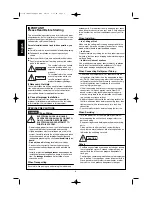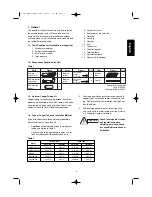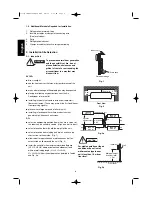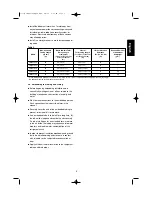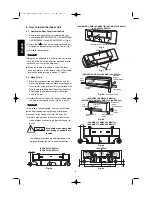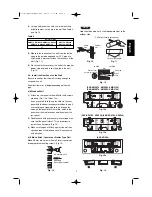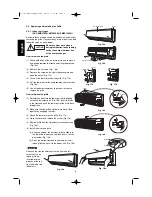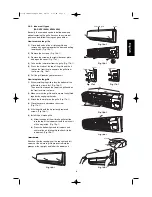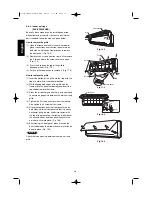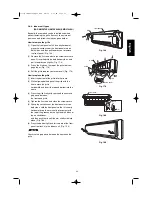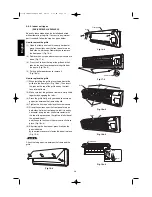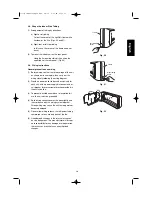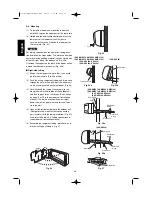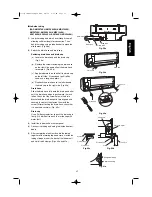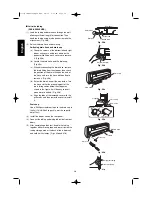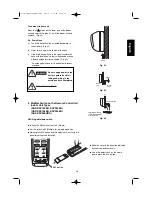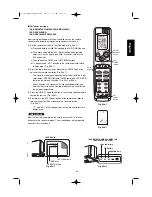
English
S
et
s
crew o
n
ly for tra
ns
portatio
n
Rear pa
n
el
mark
s
Left
tubing
Right tubing
Downward tubing
Right-rear
tubing
(recommended)
Left-rear
tubing
3. How to Install the Indoor Unit
3-1. Remove the Rear Panel from the Unit
(1) Remove and discard the set screw on the rear
panel except SAP-KRV96EHDS, SAP-KMRV76EH,
SAP-KMRV96EH and SAP-KMRV126EH. (Fig. 6)
(2) Press the 2
L
L
marks on the frame cover and dis-
engage the stationary tabs from the frame. (Fig. 7)
(3) Remove the rear panel.
Tubing can be extended in 5 or 6 directions as shown
in Fig. 8a or 8b. Select the direction you need provid-
ing the shortest run to the outside unit.
G
When left tubing is to be done, switch the drain
hose and drain cap. (For details, refer to “Switching
drain hose and drain cap” on page 17 and 18.)
3-2. Make a Hole
(1) Place the rear panel from the indoor unit on the
wall at the location selected. Make sure the panel
is horizontal, using a carpenter’s level or tape mea-
sure to measure down from the ceiling. Wait until
after cutting the hole before attaching the rear
panel to the wall.
(2) Determine which side of the unit you should make
the hole for tubing and wiring. (Fig. 9a, 9b or 9c)
In the case of left-rear tubing, use the measurement
points from the edge of the rear panel for precise
placement of the hose outlet. (Fig. 9a, 9b or 9c)
(3) Before making the hole, check carefully that no
studs or pipes are directly run behind the spot to
be cut.
The above precautions are also applicable if tub-
ing goes through the wall in any other location.
NOTE
NOTE
Fig. 9b
CAUTION
Also avoid areas where elec-
trical wiring or conduits are
located.
70 mm
Fig. 9a
(SAP-KMRV74, KMRV94, KMRV124)
(SAP-KMRV76, KMRV96, KMRV126)
60 mm
(SAP-KMRV74, KMRV94, KMRV124) (SAP-KRV184, KRV244)
(SAP-KRV186, KRV246)
Fig. 9c
3
40
27
8
42
42
Left
t
u
bi
ng
Ri
g
ht
t
u
bi
ng
Ri
g
ht-rear
t
u
bi
ng
(recomme
n
ded)
Ri
g
ht-dow
n
ward
t
u
bi
ng
Left-rear
t
u
bi
ng
Left-dow
n
ward
t
u
bi
ng
Fig. 8b
6
Fig. 8a
Fig. 7
(SAP-KRV184, KRV244) (SAP-KRV186, KRV246)
Fig. 6
(SAP-KMRV74, KMRV94, KMRV124)
(SAP-KMRV76, KMRV96, KMRV126) (SAP-KRV96)
(SAP-KRV184, KRV244)
(SAP-KRV186, KRV246)
(SAP-KRV96)
07-370 CMRV3146EH_IU ENG 2/6/08 1:31 PM Page 6


